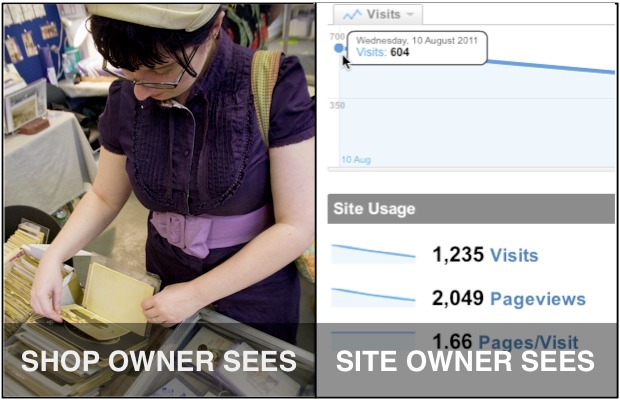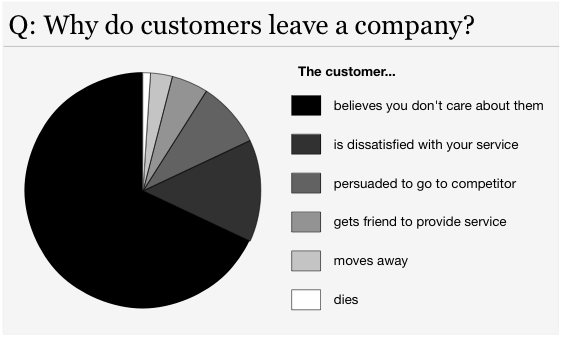The death and rebirth of customer experience
Des Traynor, COO of Intercom, stresses the importance of good customer communication and explains how to connect to your customers to turn them from idle browsers into active, loyal and passionate visitors
Trading online is seductive. No rent. No property tax. No opening hours. It's 24/7/365 and more than that it's worldwide. There's one thing it isn't. Personal. Let's look at two ways to sell CDs.
Rick owns an indie music shop. The sort of shop well satirised in Stephen Frears’s High Fidelity. Rick knows I'm here to research an article, so he ignores me. I wait near the counter watching him study his customers. He is focused on an indie college girl, all pink hair and piercings. She's expertly flicking through a bin of CDs, analysing them at a rate of five per second. Within only a few minutes she has worked through an entire wall, from Air through to Ziggy Stardust. Rick goes through her purchases at the check-out, studying them, and compliments her choices. They chat in detail about up and coming bands, Rick throws in a couple of singles, and asks her what else she was looking for. He takes some notes, and she says she'll be back Saturday morning. "Bring your friend, tell him I'll stock his CD" shouts Richard as she waves goodbye. It would be easy to dismiss this as fruitless flirting, but the seven-foot biker with a basketful of Megadeth receives equal attention. Rick profits when his customers enjoy coming to his shop. He gets it.
Karl arrives late into work. There's no starting time or closing time, his store is always open. Like Rick, Karl sells CDs, but that is where the similarities end. Karl runs a website, and his first task every day is to run a sales query. Eleven sales so far this morning, and a total of 183 yesterday. Not bad going, but way down from last summer. Search Engine Optimisation (SEO), Google AdWords, landing page optimisations, that's what Karl does next. Then he has his lunch. If you asked Karl who his best customers were, he'd run a database query. If you ask him who had the weirdest taste in music, he'd run a more complicated database query. If you asked him to introduce him to a customer, he'd be stuck. Karl can recite conversion figures, click-throughs, costs per acquisition and average order size, but he has no idea who buys his CDs; to him they're all just rows in a database.

Sound familiar?
Customer service online has been relegated to "handling complaints". Sites like to boast about how quick they can respond, but it's rare you'll hear any boast about what a great shopping experience they had online.
Online businesses are obsessed with user experience, optimisations, page rankings and much more. Yet a thousand of their customers could walk past their offices every morning, and they wouldn't even recognise them, never mind offer to stock their friend's CD.
In our quest towards total commerce automation, we've failed to bring the most important part of commerce with us. The customer experience.
Get the Creative Bloq Newsletter
Daily design news, reviews, how-tos and more, as picked by the editors.
Speaking to the lead designer of a well known online travel site, he complains that it's all about cheap cheap cheap. The only innovation these days seems to be in different ways to hide fees and other costs. Seth Godin had this nailed in 2007. "Maybe the reason price is all your customers care about is, that you haven't given them anything else to care about."
Where are your customers going?

The chart above shows a well-cited study by the Rockefeller corporation studying precisely why customers leave. Everyone expects that people leave because of lower priced competitors. If not that, then because of some gimmick their competitor has. It's rarely the case. Customers leave because they don't feel that you care about them. Online retailers are at best apathetic about their customers. I've spent literally tens of thousands of dollars on flights and holidays with some travel companies, and my reward is weekly spam from their newsletter. Unsubscribe.
With this degree of apathy, it's no surprise that people booking flights have 10 tabs open running parallel queries. There is no service, there is no customer care, so it's no surprise there is no loyalty.
He who cares wins
Each era of the web has brought new "must-have" skills. It used to be a "CSS web designer", then it became "Web 2.0", and of late it has been "UX designer". Each skill starts out as rare and exciting, but all end up being simply the cost of entry. Already it's a clich to claim your app is "easy to use". It will come down to relationships.
Companies that have a strong bond with their users will succeed. Those who focus on short term tactics will experience short term customers. The investment in relationships is high, but the reward is significant.
Building relationships
Let's state the obvious. Here's what doesn't work.
- John searches for XBOX Game
- John clicks advert
- John arrives at site, and purchases game
- Game is delivered and John is satisfied
- John receives email every week from then onwards offering games he already owns, or doesn't care about. Music he doesn't listen to, electronics he can't afford
- John unsubscribes, or worse creates a filter to ignore mails
There is nothing personal about filling in pre-defined web forms. There is nothing memorable about entering credit card details and clicking "Submit". To get John back again, a business needs to do more than issue receipts and fulfil obligations. It needs to reach out and be human. Every communication from a business is a chance to delight your customers.
Again, here's what doesn't work:
______________________________________________________________________________
Re:Tracking Reference #131731
Dear Customer,
Do not reply to this email.
Your order (#131731) has been shipped. Deliveries take between 24 and 72 hours. We cannot investigate deliveries until 72 hours have passed. We will endeavour to ensure that your order is delivered on time.
Thanks for shopping with XTremeWebGamez.
XTremeWebGamez
XTremeWebGamez is a wholly owner subsidiary of WebXTreme. Our company accepts no liability for the content of this email, or for the consequences of any actions taken on the basis of the information provided, unless that information is subsequently confirmed in writing. If you are not the intended recipient you are notified that disclosing, copying, distributing or taking any action in reliance on the contents of this information is strictly prohibited.
______________________________________________________________________________
John has spent £50 with this company and gets an automated thanks, combined with instructions about how he can't contact them. Is it any surprise he doesn't run back?
Making the connection
What if John received a personal mail, from a real employee who takes replies? What if they employee knew that because he liked FIFA 12, he might have an interest in Pro Evo Soccer and offered to put him on the waiting list for that? What if the employee offered a phone number to call if there any any concerns with the order? What if 11 months later John gets another personal mail, offering him first place on FIFA 13 waiting list? Actions like these say so much more than Do Not Reply.
Personal contact can be costly, but I'd argue it's a justifiable expense. If you're willing to spend to get customers, you should be willing to invest to keep them.
For startups, offering this level of service is mandatory. When you're trying to grow a user base, you simply can't afford to lose customers every month. You have to care. When you're a larger company, with thousands of regular shoppers, then you have to make a choice. It can be assumed that all users are price-conscious, but only when comparing goods and services of perceived equality.
If you want to elevate your business out of the race-to-the-bottom, good customer service is the key. Loyal customers who feel valued are your road to riches. Loyal customers shop more, pay more, are the first to forgive, the last to criticise, and are your number one marketing channel.
So, introduce me to yours.

Thank you for reading 5 articles this month* Join now for unlimited access
Enjoy your first month for just £1 / $1 / €1
*Read 5 free articles per month without a subscription

Join now for unlimited access
Try first month for just £1 / $1 / €1

The Creative Bloq team is made up of a group of art and design enthusiasts, and has changed and evolved since Creative Bloq began back in 2012. The current website team consists of eight full-time members of staff: Editor Georgia Coggan, Deputy Editor Rosie Hilder, Ecommerce Editor Beren Neale, Senior News Editor Daniel Piper, Editor, Digital Art and 3D Ian Dean, Tech Reviews Editor Erlingur Einarsson, Ecommerce Writer Beth Nicholls and Staff Writer Natalie Fear, as well as a roster of freelancers from around the world. The ImagineFX magazine team also pitch in, ensuring that content from leading digital art publication ImagineFX is represented on Creative Bloq.
